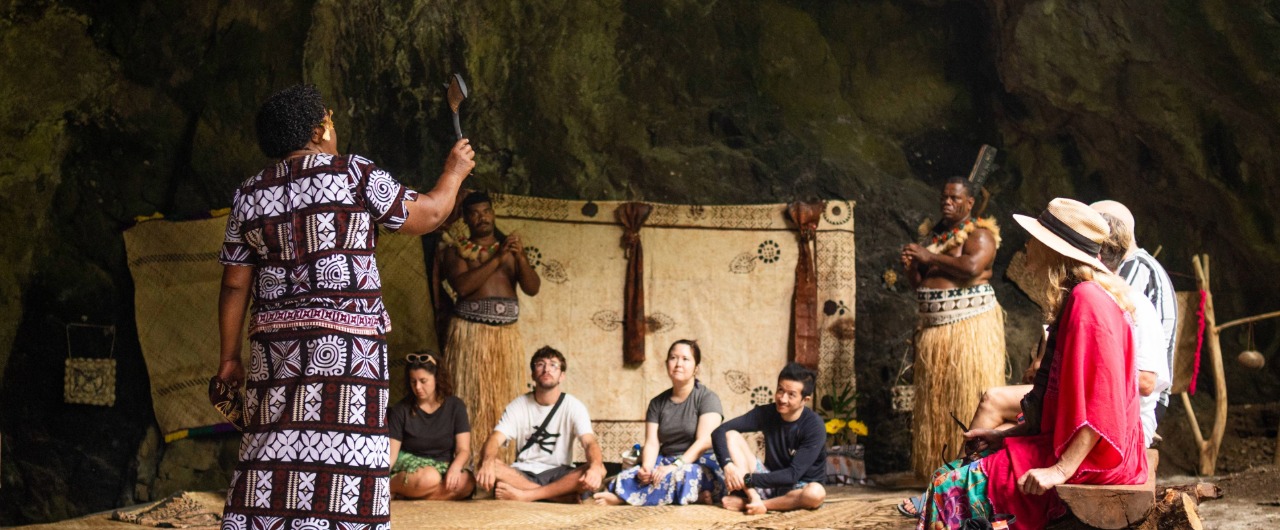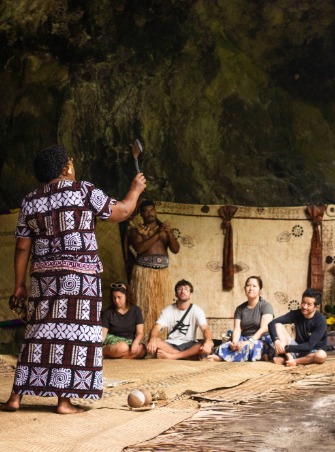Bringing a piece of Fiji home is more than picking up a pretty souvenir - it’s also about finding something made with heart by local hands. From handwoven mats and carved clubs to colourful shells and printed masi, each item is full of island character and makes a great vacation memento.
Popular Fijian Artefacts and Handicraft
If you’re wondering what to buy, start with these traditional crafts.
Once used in warfare, hand-carved hardwood clubs are now mostly decorative. Each carved club displays intricate patterns that reflect its use and heritage. Always buy from an established shop or trusted carver, and keep in mind that clubs are quite heavy.
Made from the paper mulberry tree and hand-stamped with black and brown natural dyes, masi is usually only worn on special occasions and passed down through generations. Each region has its own striking motifs lending a delightful diversity to the patterns. Lightweight and easy to pack, masi make stunning wall hangings and beautiful gifts.
The carved tanoa bowl is central to kava ceremonies in Fiji. Most are plain and practical, but you can also buy Intricately carved and decorated tanoa bowls for display.
Traditionally used to signal village gatherings, the wooden lali drum is now used mostly for Fijian music, dance and to welcome guests at resorts. The smaller versions sold in shops make rhythmic, playable souvenirs for your home.
-
Woven Mats, Baskets & Fans
Handwoven from reeds, pandanus or coconut leaves, these practical items are symbolic of daily Fijian life. From mats and baskets to fans, they’re eco-friendly, durable, and travel well – just ensure you check your customs regulations for plant-based goods.
Where to Shop for Fijian Handicrafts
Now that you know what to look for, here’s where to find authentic Fijian crafts.
-
City Handicraft & Flea Markets
Nadi Handicraft Market, Suva Municipal Market, and other local town markets are treasure troves of masi, woven mats, baskets, fans, and carved wooden items. Take your time browsing, compare prices make time to bargain and chat with artisans.
These pop-up markets showcase a rotating mix of local crafters, designers, and artists. Look out for the RoC Market, Garden City Market, Damodar Night Market in Suva, or Vuda Market near Nadi and Lautoka for one-of-a-kind finds.
Usually held in Suva, this annual expo celebrates Fiji’s talented women artisans. You can browse handwoven mats, printed masi, and intricate textiles from across the islands. Smaller regional expos are sometimes held in other urban centres like Lautoka.
Large retail stores like Jack’s Handicraft are perfect for small, suitcase-friendly items like jewellery, carvings, or textiles. Other shops to look for local craft and textiles include Pacifique Artisans Collective (in the Suva Flea Market), Projects Collective (at Beachouse Fiji Resort and Nadi) and Rise Beyond the Reef (Sabeto Shed Shop and Port Denarau in Nadi).
Bargaining Tips
Shopping Fiji’s markets is very relaxed, friendly, and a little bargaining is part of the fun - even locals do it! The best approach is to browse several stalls first, compare prices, and politely ask for a discount if buying multiple items. Start with a lower but fair offer, keep it light, and always bargain with a smile.
Most resort and gallery shops have fixed prices. You can ask for a discount on multiple items but its less acceptable. Make sure to carry cash in small notes for markets and smaller vendors.
Avoiding Scams
Be cautious if you are approached on the street by someone selling an artefact as they could be a ‘sword’ seller. Although friendly at first, once they carve your name on the item, they will pester you for payment or a donation. Politely say “no thanks” before they start carving and walk away. Also avoid buying items in isolated areas and never feel pressured to purchase anything.
Taking Souvenirs Home
It’s always best practice to declare items made from natural materials such as wood, shells, or plants to avoid confiscation or heavy fines. Usually, clean, dry goods are fine. Pack fragile carvings in a cloth wrap and roll or flatten woven items.
The best souvenirs are those that are both beautifully crafted and support small businesses that make it. By choosing something with care, you’re supporting indigenous arts and crafts, impacting local livelihoods, and you’ll always have a something unique to remind you of your time in the islands.

